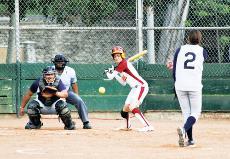In many ways, the play “Dawn’s Light: The Journey of Gordon Hirabayashi” is more than just a retelling of the true journey of then-University of Washington student, portrayed by actor Blake Kushi.Set against the backdrop of World War II, “Dawn’s Light” tells the story of Hirabayashi, from his initial refusal to abide by an imposed curfew on Japanese Americans, to his imprisonment for defying government-sanctioned evacuations and finally, his eventual victory over the Supreme Court’s decision that upheld his conviction on charges of violating national law.
“The works of a lifetime, sung to a song, lost in the wind,” said the protagonist during his closing soliloquy, speaking on the hopelessness many Japanese were imbued with after emerging from the camps, years of life and work stripped away by forced internment. But in documenting those grim events, the play also proved the resilience of the human spirit.
The one-man show was an exercise in role-playing and tested Kushi’s abilities, the actor taking on numerous personas at different points throughout the play.
Performing before a simple backdrop etched with the words of the preamble to the U.S. Constitution, Kushi gave a one-man, tour-de-force performance that floored the audience in Creveling Lounge.
“He’s terrific,” one audience member audibly whispered in the closing seconds of the play, a one-time engagement held Monday afternoon.
PCC President Lisa Sugimoto, of Japanese heritage herself, was in tears by play’s end.
Using no other props than a pair of glasses, three chairs, a suitcase, jacket and single coat stand, Kushi instead wowed the crowd with a visceral performance that at times called for the actor to run furiously in circles, fill the room with jubilant shouts and cry, his face contorted in crumpled red helplessness.
The play came to PCC as part of tour sponsored by Southern California Edison and was presented by East West Players, a prominent Asian-American theater organization.
It dovetails with a program the college is engaged in, California Nisei Diploma Project, which aids public higher education institutions in their search for former Japanese American students who had their educations interrupted by the war, looking to offer them the honorary degrees they may have never received.
“It’s been a long time coming to hear these stories,” said Carrie Afuso, coordinator for the Cross Cultural Center, in her introduction to the play. “It was not until I got to college that I heard about them.”
The version shown in Creveling was an abridged one, though it did not fail to thrill before an audience of about 30, each member raptly engrossed in the 45-minute play.
Poignant was not only Hirabayashi’s triumphant story of justice (however delayed), but also the history surrounding it. As “Dawn’s Light” reveals, the U.S. government was guilty of destroying evidence and misleading the Supreme Court and Congress in Hirabayashi’s case, in addition to others similar to his.
The atmosphere of racism and hysteria after the Dec. 7, 1941 bombing of Pearl Harbor drove President Franklin Roosevelt to sign into effect Executive Order 9066, which ordered the uprooting and internment of Japanese Americans, citizens or otherwise.
Despite the dark plot, the play was interspersed with moments of wit that reminded the audience of the human capacity to persevere by any means possible, including humor.
“You look good!” Hirabayashi’s father said upon seeing his son in Kings County Jail, Seattle, five months after they had last met.
“You look good too,” a stunned Hirabayashi said in response, eliciting laughter from the crowd.
The relationship between Hirabayashi and his parents-“shungo” for father in Japanese, and “mitsu” for mother-is a theme central to the play, as “Dawn’s Light” opens and closes with a Japanese proverb Hirabayashi learns from his father.
“The nail that sticks out gets hit first,” shungo says to his son, in order to dissuade him from defying the U.S. government. “One must conform, one must obey, one must be inconspicuous.”
But as the audience finds out later, after Hirabayashi prevails: “The nail that sticks out gets hit first. unless the hammer is smaller than the nail.”
Following the performance, playwright Jeanne Sakata was present for a question and answer session with the audience. She touched upon the importance of bringing Hirabayashi’s story to light, inspired by a PBS?documentary featuring the activist.
“The more I found out about Hirabayashi, the more intrigued I was,” Sakata said. “And I thought there was something terribly wrong that I hadn’t heard about him until I was an adult.”
Sugimoto also highlighted the importance of telling his story. “It’s an exciting time for the college, and this play is important for our education,” she said.

Blake Kushi depicts a student jeering at Gordon Hirabayashi in the one-man play, “Dawn’s Light (Steven Valdez)
- EDITORIAL: Apologize about the real problem - April 23, 2014
- STATEMENT: District apologizes to Oscar winning alum - April 21, 2014
- EDITORIAL: The Forgotten Students - March 26, 2014
